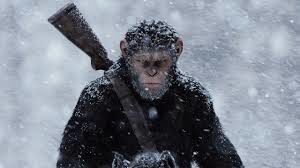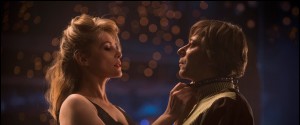THE APES OF WRATH: Movie Review of War for the Planet of the Apes by Howard Casner
Posted: July 22, 2017 | Author: Donald | Filed under: Uncategorized | Tags: Andy Serkis, Mark Bomback, Matt Reeves, Steve Zhan, War for the Planet of the Apes, Woody Harrelson | 19 Comments » First, a word from our sponsors: I wanted to say thank you to everyone who contributed to our Indiegogo campaign for 15 Conversations in 10 Minutes. We did very well due to you folks. For those who weren’t able to give, keep us in your thoughts. And if you are able to contribute in the future, contact me and I’ll tell you how. I will even honor the perks on the
First, a word from our sponsors: I wanted to say thank you to everyone who contributed to our Indiegogo campaign for 15 Conversations in 10 Minutes. We did very well due to you folks. For those who weren’t able to give, keep us in your thoughts. And if you are able to contribute in the future, contact me and I’ll tell you how. I will even honor the perks on the
I am now offering a new consultation service: so much emphasis has been given lately to the importance of the opening of your screenplay, I now offer coverage for the first twenty pages at the cost of $20.00. For those who don’t want to have full coverage on their screenplay at this time, but want to know how well their script is working with the opening pages, this is perfect for you. I’ll help you not lose the reader on page one.
Ever wonder what a reader for a contest or agency thinks when he reads your screenplay? Check out my new e-book published on Amazon: Rantings and Ravings of a Screenplay Reader, including my series of essays, What I Learned Reading for Contests This Year, and my film reviews of 2013. Only $2.99. http://ow.ly/xN31r
and check out my Script Consultation Services: http://ow.ly/HPxKE
Warning: SPOILERS
 I am well aware as to what the critics and my fellow movie goers feel about War for the Planet of the Apes.
I am well aware as to what the critics and my fellow movie goers feel about War for the Planet of the Apes.
And I don’t care.
As far as I’m concerned, this second sequel and third prequel of the Planet of the Apes franchise written by Mark Bomback and the director Matt Reeves is perhaps one of the worst films of the year. Read the rest of this entry »
APEOCALYPSE, OR OF APES BOTH NAKED AND HAIRY: Movie reviews of Venus in Fur, Life Itself and Dawn of the Planet of the Apes
Posted: July 18, 2014 | Author: Donald | Filed under: Uncategorized | Tags: Alexandre Desplat, Amanda Silver, Andy Serkis, David Ives, Dawn of the Planet of the Apes, Emmanuelle Seigner, Gary Oldman, Gene Siskel, Jason Clarke, Keri Russell, Kodi Smit-McPhee, Leopold von Sacher-Masoch, Life Itself, Mark Bomback, Martin Scorcese, Mathieu Almaric, Matt Reeves, Rick Jaffa, Roger Ebert, Roman Polanski, Steve James, Toby Kebbell, Venus in Fur | 6,166 Comments »First, a word from our sponsors. Ever wonder what a reader for a contest or agency thinks when he reads your screenplay? Check out my new e-book published on Amazon: Rantings and Ravings of a Screenplay Reader, including my series of essays, What I Learned Reading for Contests This Year, and my film reviews of 2013. Only $2.99. http://ow.ly/xN31r
Warning: SPOILERS
 The new movie, Venus in Fur, co-written by bad boy old timer Roman Polanski (who also directed) with relative new comer David Ives, from a play by Ives that was influenced by a book by Leopold von Sacher-Masoch (yeah, that Sacher-Masoch—oh, no, don’t even try it, you know very well whom I’m talking about, you can’t fool me), begins during a somewhat impressionistic rain storm on a deserted street in France (so I guess the slight touch of impressionism shouldn’t be a surprise) backed by a music score of sublime slyness.
The new movie, Venus in Fur, co-written by bad boy old timer Roman Polanski (who also directed) with relative new comer David Ives, from a play by Ives that was influenced by a book by Leopold von Sacher-Masoch (yeah, that Sacher-Masoch—oh, no, don’t even try it, you know very well whom I’m talking about, you can’t fool me), begins during a somewhat impressionistic rain storm on a deserted street in France (so I guess the slight touch of impressionism shouldn’t be a surprise) backed by a music score of sublime slyness.
In fact, the score is so sublime, so sly, so clever, so flippant, so wicked, so…well, just so everything that I found myself being driven crazy because I couldn’t place the composer. And then at the end, during the credits, there it is—the name Alexandre Desplat, and all I could think was, of course, who else could it possibly have been. Read the rest of this entry »
Movie Reviews of ONLY GOD FORGIVES, THE WOLVERINE and WASTELAND by Howard Casner
Posted: August 1, 2013 | Author: Donald | Filed under: Uncategorized | Tags: Hugh jackman, James Mangold, Kirsten Scott Thomas, Larry Smith, Luke Treadway, Mark Bomback, Nicolas Winding Refn, Only God Forgives, Rowan Athale, Ryan Gosling, Scott Frank, Svetlannd Khodchenkova, The Wolverine, Timothy Spall | 8 Comments »I hate to say it. It’s so snarky and such a cliché and I hate it when I hear someone else say something like it, but I simply don’t know a better way to phrase it: Only God Forgives is the sort of movie a filmmaker makes when he starts believing his own press. In other words, it’s a film that shows incredible talent on the part of its director Nicolas Winding Refn (who also wrote the screenplay), but is so showy, ostentatious, gaudy and florid, calling attention to how brilliant the filmmaker thinks he is, that it becomes impenetrable as it drowns in its own pretentiousness. One just stares at the screen trying to figure out what everyone was thinking while you’re thinking to yourself, “I’m sure it means something to the filmmakers, but hell if I can make heads or tells of it”.
This is too bad, I mean, really too bad, because Refn is the wunderkind from Denmark who made his name with the Pusher trilogy (which I haven’t seen) and used the notoriety of those films to come to the U.S. to make Drive, that glorious neo-noir about a stunt driver by day, get away driver by night, who finds himself conflicted when he falls for his neighbor who has a little boy as well as a husband in jail. That movie was a controlled, tension filled character study with a real page turner of a story. In contrast, Only God Forgives moves at a snail’s pace with a story made up of beautiful sets filled with people who often sit or stand immobile looking like mannequins, all filmed within an inch of its listless life (the stunning cinematography is by Larry Smith)—it’s as if Macy’s windows were designed by Chan-wook Park or Kar Wai Wong.
The basic story revolves around an American with mommy issues who runs a boxing gym in Bangkok. When the American’s psychotic brother rapes and kills a sixteen year old prostitute, a fascistic, but righteous, police detective uses very righteous and fascistic means to restore order by manipulating the prostitute’s father/pimp into killing the brother. When the American finds out what his brother did, he lets the father go. But then the American’s mother comes to town ahead of an expected drug delivery and she wants vengeance.
Ryan Gosling plays the American, and like many of his other roles, he’s probably a bit too metrosexual for the part (he speaks so little so that whenever he does, his tinny voice seems a bit out of place). In the end, it’s Kirsten Scott Thomas as the mother, in wicked Babs Stanwyck blonde tresses, and Vithaya Pansringar, as the righteous police detective with a karaoke fetish, who deliver the most effective performances (Thomas also has the best line; when she finds out what her son did to the prostitute, she says, “Well, I’m sure he had his reasons”).
Much has been made of the violence in the movie and it’s there, for sure, but it’s nothing that out of the ordinary for this sort of film and I’m not sure what everyone is so upset about. At the same time, IMHO there is some hypocrisy here. It’s obvious that Thomas has more going on in her relationship with her sons than simply expecting a card on mother’s day. But while Refn has no problem throwing gallons of blood around the sets, he seems to balk at showing incest. I’m not convinced the movie is as brave as Refn may think it is. Even White Heat with James Cagney was more daring in this area.
In the end, Refn has nobody to blame but himself for how it all turned out. He is the director and the writer after all, so it’s a little hard to find another fall guy. But it might be interesting to take note: for the first film in the Pusher trilogy, he co-wrote the screenplay with Jens Dahl; Drive was written by Hossein Amini. And there is something about this movie that does show contempt for screenwriters. It’s a film that feels all driven by the vision of an auteur who doesn’t think he needs help to reach his vision. There was certainly potential here, but it might have been interesting to see how it would have all turned out if someone else had written the screenplay.
The Wolverine is a perfectly acceptable entry in the rash of blockbusters revolving around comic book heroes. There’s nothing that wrong with it and ends up being more fun than one might think. Perhaps the easiest way to say it is that on a scale of one to ten, it’s far, far superior to Pacific Rim and Man of Steel, but it’s no Iron Man or The Dark Knight. It stars Hugh Jackman in the title role and he looks great in his Elvis sideburns and motorcycle tough Marlon Brando clothes. The serviceable screenplay is by Mark Bomback and Scott Frank; the ditto direction is by James Mangold. It all revolves around some dirty dealings among a wealthy Japanese businessman; the Yakuza; and a walking virus of a slinky blonde (played amusingly by Svetlannd Khodchenkova, again in tresses gold of Stanwyck Babs). In the end, it should be said the movie doesn’t paint the country of the rising sun in a particularly positive light: it’s major themes seem to be that save a Japanese soldier from the bombing (atomic, of course) of Nagasaki, he’ll still stab you in the back, and Japan is a country run by the rich and the mob with a police force that doesn’t seem to exist.
Wasteland is a sort of heist film that is structured in such a way that the pay off finale is its only real reason for existence. Because of this, the screenplay (by the director Rowan Athale) has only one purpose and that is to revolve itself around the “surprise” twist ending (the surprise is in quotations because it’s really not all that big a surprise by the sweet time it takes to finally get there). What happens is often what happens in movies structured this way: the story and the characters never quite seem believable or satisfying since they are not there to drive or tell the story, but only to set up the ending.
The story unfolds in an as told to way: recently released petty criminal Harvey (Luke Treadway) is being interrogated by DI West (Timothy Spall) after being found at the scene of a crime, a break in at a club owned by a mobster with the mobster’s enforcer, who Harvey has a grudge against, lying almost dead on the ground in front of him. Harvey, who is in pretty bad shape himself, tells West what happened.
It’s not a bad way to tell a story, but it’s a fairly clunky one here. Athale makes one of the most common mistakes in screenplays like this: Harvey tells West all sorts of details that he couldn’t know since he wasn’t there to witness the events himself. And the way he tells a story doesn’t feel like the way an accused criminal would tell it, but the way a character needs to tell it so the audience gets the whole shebang (again, to set up the ending). He doesn’t even tell West the same story the audience sees: at the very end, we discover suddenly that Harvey has never used the names of his accomplices the whole time in talking to West, though in the flashbacks, the names are constantly used—so what parts of the story did he tell West and which didn’t he? (And just how hard is it going to be for West to figure out just who these friends of Harvey are anyway? One of them is Harvey’s roommates, for Christ’s sake, not to mention a character who is his ex-girlfriend)
Though there is something satisfying about Harvey’s ultimate plan (Harvey wants revenge and he gets it, sort of; the enforcer ends up in hospital, but there’s no indication that anything more is going to happen to him), it’s just dramatized in a somewhat slipshod manner and it’s all a bit convoluted with too many goals for the characters. And the ending with West listening to Harvey one more time is ridiculous and not one iota believable (again, it’s not there because the characters would act this way, but out of necessity to reveal to the audience that “surprise” ending).
At the same time, everybody gives the whole shebang their all. You certainly can’t fault any of them. They get more than everything out of their parts that they can and, in fact, act as if an Oscar nomination depended upon it. At the same time, they are trapped by lengthy sets of dialog that often go on and on. One doesn’t always know how to react the verbosity. Sometimes you admire the actors for their dexterity in saying Athale’s realistic and vibrant dialog; at other times, you just want to yell at the screen, just shut the hell up and get on with it already. Only Spall, with his long suffering, jowly bull dog look, gives the strongest and most interesting performance (and Athale’s biggest error as screenwriter is probably the underuse of this character).











